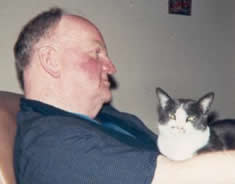There was a new course in the history and philosophy of science [at
Sydney University], established by a Dr Hugh Lacey, in 1967, with a
subject I’d longed to learn more about – I wish in a way
I had had a chance to have had a training, just for my own interest,
an academic training in physics. And I’d heard well of Dr Lacey.
I asked him by post or telegram could I, a mature fellow, sit in on
his classes in the Faculty of Science. He sent me a telegram back, 'By
all means.' And that was the beginning, the beginning of the first term
of 1967.
It was a very good course, I enjoyed it, it was an immensely interesting
course, and I supplemented it with a bit of private coaching by two young
mathematics graduates on the North Shore in the more abstruse parts of
Einstein’s general theory of relativity. Unfortunately the young
graduates, bright as they were, weren’t able to give me full satisfaction
and admitted so.
So, that all ended in one year. Lacey covered a large amount of territory
in that history and philosophy of science, both historical and contemporary.
Some excellent textbooks that he set. Such things as the debate on the
nature of space and time between Isaac Newton’s close friend, Clarke,
and Leibniz. The Leibniz-Clarke correspondence, fascinating discussion,
and things like that. When that one year was up I felt, 'Oh, it’s
a pity I can’t keep this up.'
I sat and got a High Distinction. It was only one year but it was in
the Faculty of Science and it was a dead end. So then at a bit of a loss
I thought I’d do a little bit of philosophy. I’d never done
that in my undergraduate days. So I did one year of philosophy in which
the main teacher was David Armstrong, whom I knew. And at the end of that
year I was again at a bit of a loss.
Now this is 1967, 1968, we’re going into 1969 now. Having over
the vacation read a fair bit about the early Greek philosophers, the pre-Socratic
philosophers, I thought the next thing for me was to study some Greek.
So I did Elementary Greek in 1969 and Greek 1 in 1970. And that was the
end…But the Greek was, oh, it was most rewarding, immensely rewarding.
And it’s enabled me in a very amateurish way to keep up a little
bit with reading in those areas ever since.
In philosophy I think all you could get was a Credit. I’ve ...the
large number of Credits and I was down on the list somewhere, perhaps
at number twenty. In Greek I either equalled first place or was second
place with a very bright girl whose name was Dowd. I’d love to know
what happened to her.
We read through some great Greek literature, passages of great Greek
literature and only one or two teachers, of all they had, ever adverted
to the power of the literature as distinct from the grammatical side of
it. It was quite weird sometimes to have this lecturer or professor quoting
slabs of speeches from a Greek drama then giving a translation and going
on and never making any reference to the quality of what you’d been
reading. But it was extraordinarily rewarding, it was dreadfully good.
Then I for various reasons decided to leave Fairfax and go to Murdoch
and that in itself would have made a continuation of the university lectures
impossible, almost...well impossible. And I thought I had more or less
run out of strongly desirable things to do there anyway.


